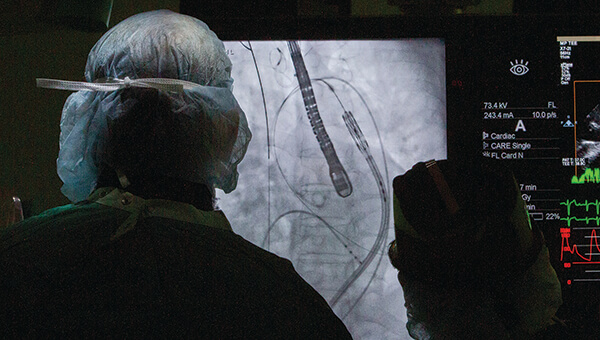Heart and Vascular Services
At Morton Plant Hospital, we lead the way in cardiovascular care. Through our award-winning Morgan Heart Hospital, we perform more open-heart and interventional procedures than any other hospital in Pinellas County.
Each year, our nationally recognized heart program performs over 500 open-heart surgeries, 1,000 interventional procedures, and 2,700 diagnostic services — and those numbers continue to grow. Our experts lead the region in treating heart failure, complex rhythm disorders, and advanced structural heart and valve conditions.
We were the first hospital in Tampa Bay to offer the TAVR procedure for patients with severe aortic stenosis — a reflection of our commitment to innovation and excellence. Our team has completed more than 1,800 TAVR procedures, making us the most experienced program in the region.
Our Center for Advanced Valve and Structural Heart Care holds the Transcatheter Valve Certification from the American College of Cardiology — a mark of trust that utilizes national clinical databases and independent review to track patient safety and real-world outcomes. Thanks to our program’s high-quality outcomes, our physicians can offer the full range of valve procedures, along with access to leading-edge research and investigational therapies. Today, many patients once considered ineligible for surgery can find relief through this life-changing procedure — and we're proud to help make that possible.

Find a Heart Specialist
BayCare has a variety of heart specialists dedicated to providing the highest quality of care. Let us guide you to the right physician.

Advanced Structural Heart & Valve Care
The Center for Advanced Valve and Structural Heart Care, the first multidisciplinary center of its kind in the area, is a leader in treating advanced structural heart and valve conditions including aortic stenosis and mitral valve regurgitation.
Heart and Vascular Surgery


Heart Rhythm Disorders
Morton Plant Hospital’s cardiac electrophysiology program is
a full-service rhythm program from testing to diagnosis to treatment of any
type of arrhythmia, including atrial fibrillation (AFib), ventricular
tachycardia, supraventricular tachycardia and atrial flutter. Our compassionate
and experienced team of doctors work with patients to ensure they have the
necessary information to make informed decisions throughout the entire process.
Our Comfortable Private Rooms and Features
There are 21 private rooms, each featuring their own beautiful accommodations including wood floors, wireless Internet access, climate control, refrigerators and sleeper chairs for families. Plus, many rooms feature a view of the Intracoastal Waterway.-
Clinical TrialsMorton Plant Hospital participates in a multitude of national and international cardiovascular clinical research trials to make the latest scientific discoveries available to the community long before they become available to the general public. Learn more about clinical trials.
-
Cardiac Rehabilitation
Morton Plant Hospital’s cardiac rehabilitation program is a medically supervised exercise and education program to help with recovery after a cardiac event. Learn more about Cardiac Rehabilitation Program and Cardiovascular Health Improvement Program. -
Heart Function
The BayCare Heart Function Clinic at Morton Plant Hospital was created for patients who have a new heart failure diagnosis or who’ve been admitted to the hospital due to heart failure. Patients and families receive individualized care and comprehensive education. Learn more about heart failure.
For a referral to a heart specialist, please call (855) 233-0888 or fill out the form on this page.
Location Information:
Morgan Heart Hospital at Morton Plant
300 Pinellas Street
Clearwater, FL 33756
(727) 462-7000
If you are experiencing pressure, heaviness or pain in the chest, arm or below the breastbone alone or in combination with sweating, nausea, extreme shortness of breath or irregular heartbeats, you may be having a heart attack. Please call 911 immediately.




